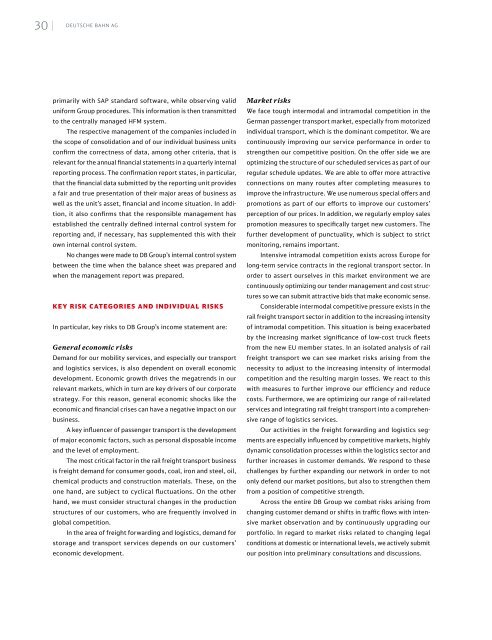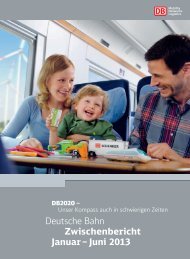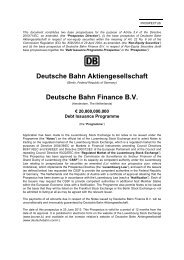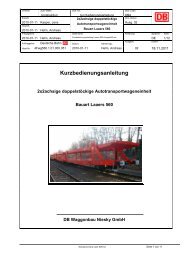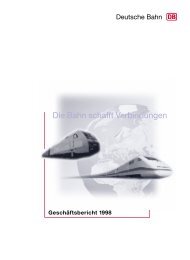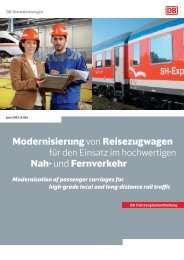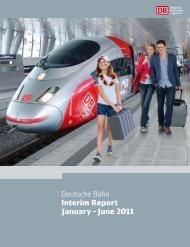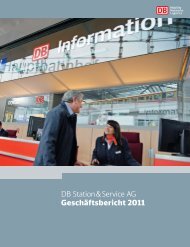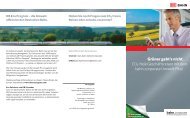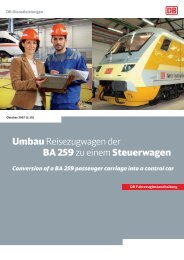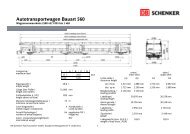PDF Download - Deutsche Bahn AG
PDF Download - Deutsche Bahn AG
PDF Download - Deutsche Bahn AG
You also want an ePaper? Increase the reach of your titles
YUMPU automatically turns print PDFs into web optimized ePapers that Google loves.
30 |<br />
DEUTSCHE BAHN <strong>AG</strong><br />
primarily with SAP standard software, while observing valid<br />
uniform Group procedures. This information is then transmitted<br />
to the centrally managed HFm system.<br />
The respective management of the companies included in<br />
the scope of consolidation and of our individual business units<br />
confirm the correctness of data, among other criteria, that is<br />
relevant for the annual financial statements in a quarterly internal<br />
reporting process. The confirmation report states, in particular,<br />
that the financial data submitted by the reporting unit provides<br />
a fair and true presentation of their major areas of business as<br />
well as the unit’s asset, financial and income situation. In addition,<br />
it also confirms that the responsible management has<br />
established the centrally defined internal control system for<br />
reporting and, if necessary, has supplemented this with their<br />
own internal control system.<br />
No changes were made to DB Group’s internal control system<br />
between the time when the balance sheet was prepared and<br />
when the management report was prepared.<br />
KeY riSK CategorieS anD inDiviDUaL riSKS<br />
In particular, key risks to DB Group’s income statement are:<br />
General economic risks<br />
Demand for our mobility services, and especially our transport<br />
and logistics services, is also dependent on overall economic<br />
development. Economic growth drives the megatrends in our<br />
relevant markets, which in turn are key drivers of our corporate<br />
strategy. For this reason, general economic shocks like the<br />
economic and financial crises can have a negative impact on our<br />
business.<br />
A key influencer of passenger transport is the development<br />
of major economic factors, such as personal disposable income<br />
and the level of employment.<br />
The most critical factor in the rail freight transport business<br />
is freight demand for consumer goods, coal, iron and steel, oil,<br />
chemical products and construction materials. These, on the<br />
one hand, are subject to cyclical fluctuations. On the other<br />
hand, we must consider structural changes in the production<br />
structures of our customers, who are frequently involved in<br />
global competition.<br />
In the area of freight forwarding and logistics, demand for<br />
storage and transport services depends on our customers’<br />
economic development.<br />
Market risks<br />
We face tough intermodal and intramodal competition in the<br />
German passenger transport market, especially from motorized<br />
individual transport, which is the dominant competitor. We are<br />
continuously improving our service performance in order to<br />
strengthen our competitive position. On the offer side we are<br />
optimizing the structure of our scheduled services as part of our<br />
regular schedule updates. We are able to offer more attractive<br />
connections on many routes after completing measures to<br />
improve the infrastructure. We use numerous special offers and<br />
promotions as part of our efforts to improve our customers’<br />
perception of our prices. In addition, we regularly employ sales<br />
promotion measures to specifically target new customers. The<br />
further development of punctuality, which is subject to strict<br />
monitoring, remains important.<br />
Intensive intramodal competition exists across Europe for<br />
long-term service contracts in the regional transport sector. In<br />
order to assert ourselves in this market environment we are<br />
continuously optimizing our tender management and cost structures<br />
so we can submit attractive bids that make economic sense.<br />
Considerable intermodal competitive pressure exists in the<br />
rail freight transport sector in addition to the increasing intensity<br />
of intramodal competition. This situation is being exacerbated<br />
by the increasing market significance of low-cost truck fleets<br />
from the new EU member states. In an isolated analysis of rail<br />
freight transport we can see market risks arising from the<br />
necessity to adjust to the increasing intensity of intermodal<br />
competition and the resulting margin losses. We react to this<br />
with measures to further improve our efficiency and reduce<br />
costs. Furthermore, we are optimizing our range of rail-related<br />
services and integrating rail freight transport into a comprehensive<br />
range of logistics services.<br />
Our activities in the freight forwarding and logistics segments<br />
are especially influenced by competitive markets, highly<br />
dynamic consolidation processes within the logistics sector and<br />
further increases in customer demands. We respond to these<br />
challenges by further expanding our network in order to not<br />
only defend our market positions, but also to strengthen them<br />
from a position of competitive strength.<br />
Across the entire DB Group we combat risks arising from<br />
changing customer demand or shifts in traffic flows with intensive<br />
market observation and by continuously upgrading our<br />
portfolio. In regard to market risks related to changing legal<br />
conditions at domestic or international levels, we actively submit<br />
our position into preliminary consultations and discussions.


